“Unraveling the Mystery: Why Italy Escaped a Post-War Reckoning for Its Atrocities”
Second, the post-war government was able to portray Italians both as perpetrators and victims of atrocities, thus ensuring Allied support or delaying efforts for extradition.
Third, similar to what happened in Germany and Japan, post-war tensions with the Soviet Bloc prompted the Western Allies to support the Italian governmentâs strategy of reconciliation and pacification. Considering the strength and size of the local Communist Party, the West simply needed the Christian Democrats to stay in power, even if it meant foregoing justice.
That said, as alluded to, not every Fascist war criminal got off scot-free. The Duce himself and his closest circle of acolytes were executed at the warâs end. And Italian authorities and partisan factions did carry out both trials and extrajudicial executions of other Fascist officials in the immediate post-war period. This fact actually allowed the government to prevent the Allies from organising a large-scale trial, claiming that direct justice had already been carried out by the Italian people.
Germany and Japan were not dissimilar, in the sense that a great deal of wanted criminals did go to court, but massively more got a slap on the wrist or not even that in some cases. Again, the most egregious of all being the Emperor of Japan himself who, contrary to popular belief since largely because of Allied propaganda in his favour, oversaw and ordered things that would make anyone but the likes of Hitler squeamish, let alone the Emperorâs uncle Prince Yasuhiko Asaka, who directly oversaw and was half in charge of one of the largest massacres in human history, occuring at Nanjing, seeing upwards of a quarter of a million civilians slaughtered in a matter of weeks, along with many thousands of other atrocities committed against the people of that city. Bizarrely it actually would have been massively worse if not for the intervention of a Nazi in the region by the name of John Rabe who is credited as saving many tens of thousands of lives during the event. Noteworthy the other individual besides Prince Asaka in charge of the whole thing, Iwane Matsui, was gone for much of this and upon return and learning the full extent of what had happened tried in vain to put a stop to it, but was quite literally not just ignored, but mocked and laughed at by his subcommanders for this, and more or less forcibly retired in disgrace, while Prince Asaka, who, again, was there the entire time and left in charge during Matsuiâs absence, seemingly had zero issue with it all.











